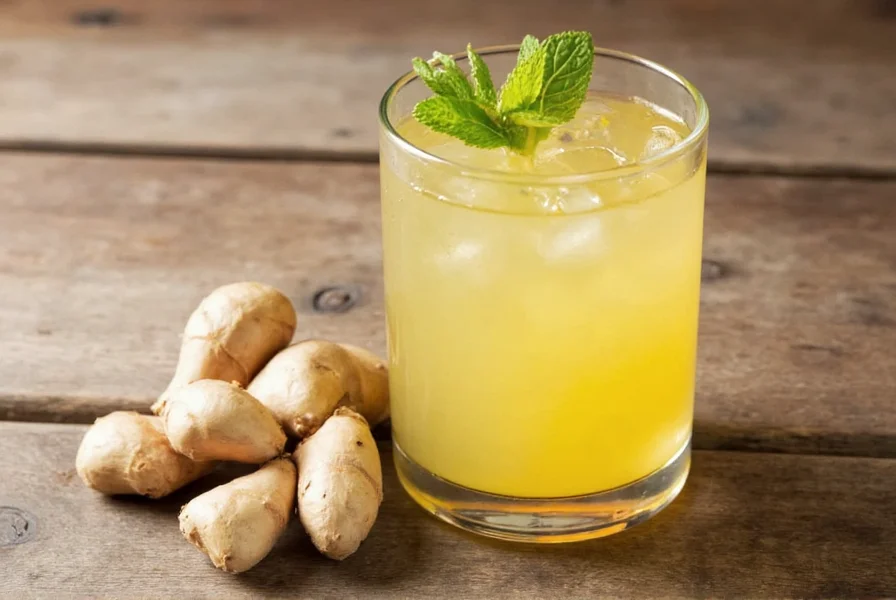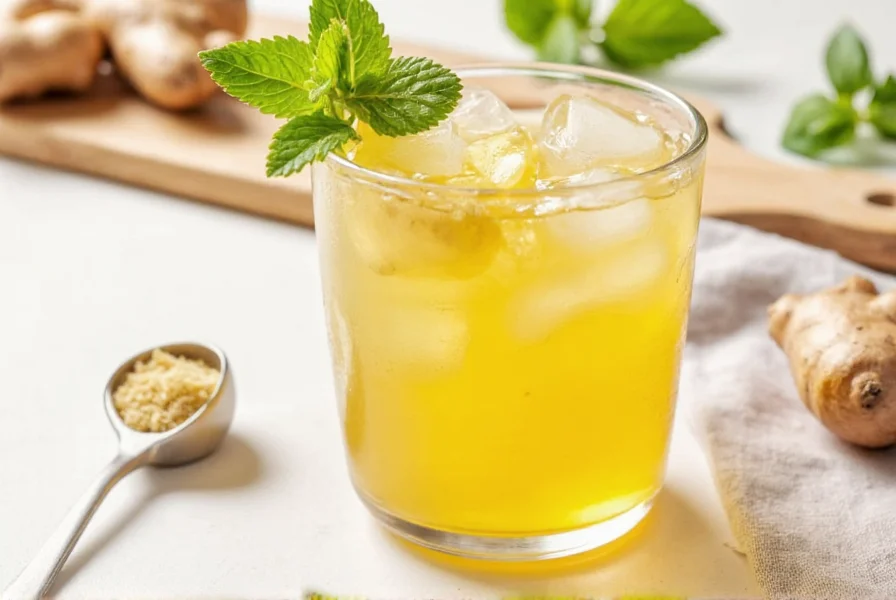Ginger drinks have been used for centuries across various cultures for both culinary and medicinal purposes. Modern research continues to validate many traditional uses of this versatile root. The active compounds in ginger, particularly gingerols and shogaols, are responsible for its therapeutic properties and characteristic pungent taste.
The Science Behind Ginger's Health Benefits
Ginger contains over 400 different compounds, with gingerols being the most studied for their health effects. According to a comprehensive review published in the International Journal of Preventive Medicine, ginger demonstrates significant anti-inflammatory and antioxidant properties that contribute to its wide range of health benefits.
One of the most well-documented benefits is ginger's effectiveness for nausea relief. A 2020 meta-analysis in Nutrients confirmed that ginger significantly reduces nausea and vomiting in various contexts, including morning sickness during pregnancy (under medical supervision), postoperative nausea, and motion sickness.

Digestive Health Support
Ginger drink benefits for digestion are particularly noteworthy. Research shows that ginger accelerates gastric emptying, which can relieve symptoms of indigestion and bloating. A study in the World Journal of Gastroenterology found that participants who consumed ginger before meals experienced 25% faster stomach emptying compared to the control group.
The mechanism behind this involves ginger's ability to stimulate digestive enzymes and enhance gastrointestinal motility. This makes ginger drinks particularly beneficial after heavy meals or for those with occasional digestive discomfort.
Different Types of Ginger Beverages
Not all ginger drinks are created equal. Understanding the variations helps you choose or prepare the most beneficial option for your needs:
| Type of Ginger Drink | Preparation Method | Key Benefits | Ginger Content |
|---|---|---|---|
| Traditional Ginger Tea | Steeping fresh ginger in hot water | Digestion support, mild anti-nausea | Moderate |
| Ginger Shots | Concentrated ginger juice, often with lemon | Strong anti-nausea, immune support | High |
| Homemade Ginger Ale | Fermented ginger, sugar, water, yeast | Digestive enzymes, probiotic benefits | Moderate-High |
| Ginger-Lemon Water | Infused water with fresh ginger and lemon | Hydration, mild antioxidant boost | Low |
How to Make Ginger Drinks at Home
Creating effective ginger beverages requires proper preparation to maximize the bioactive compounds. The method significantly impacts the concentration of beneficial compounds:
Basic Ginger Tea Recipe
This simple preparation preserves ginger's therapeutic properties:
- Peel and thinly slice 1-2 inches of fresh ginger root
- Bring 2 cups of water to a near-boil (not full rolling boil)
- Add ginger and simmer gently for 10-15 minutes
- Strain and add lemon or honey to taste (optional)
For maximum benefit, don't over-boil ginger, as excessive heat can degrade some beneficial compounds. Simmering for 10-15 minutes provides optimal extraction of gingerols.
Ginger Shot Preparation
Ginger shots deliver concentrated benefits in a small serving:
- Peel 3-4 inches of fresh ginger
- Grate or finely chop the ginger
- Add to 1 cup of water and bring to a gentle simmer for 10 minutes
- Cool slightly, then strain through cheesecloth
- Add fresh lemon juice (1 tablespoon per serving)
- Store in glass container in refrigerator for up to 5 days

When Ginger Drinks May Not Be Appropriate
While ginger drinks offer numerous benefits, they're not suitable for everyone. Certain health conditions and medication interactions require caution:
- Blood thinners: Ginger may enhance the effects of medications like warfarin
- Gallstone disease: Ginger may increase bile production, potentially causing discomfort
- Pregnancy: While generally safe for morning sickness, consult your healthcare provider about appropriate amounts
- Surgery: Discontinue ginger consumption at least one week before scheduled surgery due to potential bleeding risks
The recommended daily amount of ginger for most adults is 1-3 grams, equivalent to about 1-2 cups of strong ginger tea or one ginger shot. Excessive consumption (more than 4 grams daily) may cause heartburn or stomach upset in some individuals.
Ginger Drink Myths vs. Scientific Evidence
Several common claims about ginger drinks lack strong scientific backing:
- Myth: Ginger drinks can cure the common cold
Fact: While ginger may alleviate some cold symptoms like sore throat and nausea, it doesn't shorten the duration of viral infections - Myth: All ginger ale provides the same benefits as homemade ginger drinks
Fact: Most commercial ginger ales contain minimal actual ginger and high amounts of sugar, negating many health benefits - Myth: Ginger drinks significantly boost metabolism for weight loss
Fact: Any metabolic effect is minimal and shouldn't be relied upon as a weight loss strategy
Maximizing Ginger Drink Benefits
Certain preparation techniques can enhance the effectiveness of your ginger beverages:
- Add black pepper: Contains piperine, which increases absorption of ginger's compounds
- Include healthy fats: Adding a small amount of coconut oil helps absorb fat-soluble compounds
- Use fresh ginger: Contains higher levels of active compounds than dried ginger
- Don't overheat: Simmer rather than boil to preserve beneficial compounds
Frequently Asked Questions
What are the main health benefits of drinking ginger tea?
Ginger tea offers several science-backed benefits including relief from nausea and morning sickness, improved digestion by accelerating gastric emptying, reduced muscle pain and soreness, and anti-inflammatory effects that may help with conditions like osteoarthritis. The active compounds gingerols and shogaols are responsible for these therapeutic effects.
How much ginger should I use for an effective ginger drink?
For a standard cup of ginger tea, use 1-2 inches of fresh ginger root (about 10-20 grams). For ginger shots, which are more concentrated, use 3-4 inches of ginger per serving. The recommended daily intake of ginger is 1-3 grams of active compounds, which translates to approximately 1-2 cups of strong ginger tea or one 2-ounce ginger shot. Exceeding 4 grams daily may cause digestive discomfort in some people.
Can ginger drinks help with upset stomach and digestion?
Yes, ginger drinks are particularly effective for digestive issues. Research shows ginger accelerates gastric emptying by up to 25%, which can relieve bloating and indigestion. It also stimulates digestive enzymes and has anti-nausea properties. A study in the World Journal of Gastroenterology found ginger significantly reduced symptoms of functional dyspepsia. For best results, consume ginger tea about 20 minutes before meals or when experiencing digestive discomfort.
When is the best time to drink ginger tea for maximum benefits?
The optimal timing depends on your specific needs: for digestion, drink 20 minutes before meals; for nausea relief, consume at the first sign of symptoms; for morning sickness, sip throughout the day in small amounts; for general wellness, many people prefer morning consumption to take advantage of ginger's mild energizing effect without interfering with sleep. Avoid drinking strong ginger preparations close to bedtime as they may cause restlessness in some individuals.
Are there any side effects of drinking too much ginger?
Consuming excessive ginger (more than 4 grams daily) may cause heartburn, diarrhea, or mouth irritation in some people. Ginger may interact with blood-thinning medications and could potentially lower blood sugar levels, which requires monitoring for diabetics. Those with gallstones should consult a doctor before regular consumption, as ginger stimulates bile production. Pregnant women should discuss appropriate amounts with their healthcare provider, though moderate consumption for nausea relief is generally considered safe.











 浙公网安备
33010002000092号
浙公网安备
33010002000092号 浙B2-20120091-4
浙B2-20120091-4